Archives
-
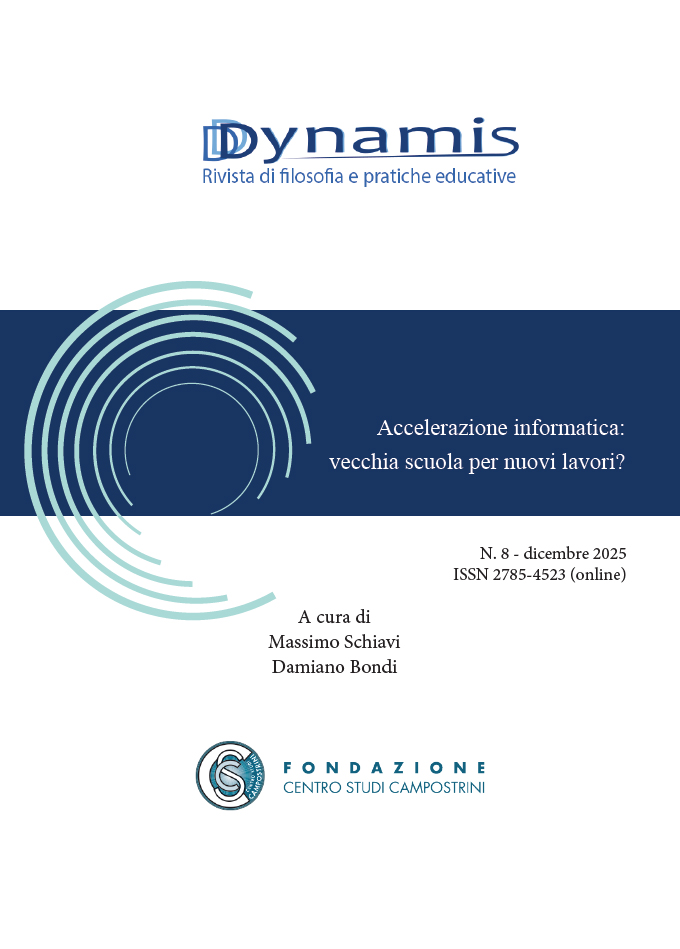
Digital Acceleration: Old School for New Jobs?
Vol. 8 No. 8 (2025)The world of work is in a constant evolution: some present jobs were simply unthinkable twenty years ago. The technological progress, the acceleration of computing, and the consequent social and civil changes directly impact the types of experiences, skills, and abilities that everyone must possess —particularly young people, who must transition from school to the workforce and society. On the other hand, recent educational italian reforms have aimed to connect the world of education with that of work in different ways and timeframes. This relationship should be realized not only in terms of professional preparation but also in terms of an education that integrates new modes of experience with skills and knowledge, placing new generations in a position to face society with confidence and competence. However, there is a discrepancy between an institutionalized and bureaucratically mediated change, such as that of the education system, and one that seems uncontrollable and unpredictable, such as that of the work, where a constant skill update is required. Sometimes it seems as if the school is desperately trying to catch something that it can never seize, continuously changing not only direction but also its very face.
This issue of Dynamis is dedicated to the complicated, real, and/or hoped-for relationship between two "worlds": that of education, on one hand, with its concerns, values, and procedures, and that of new skills, on the other, demanded by a society and a world of work that are constantly evolving, often in an uncertain and risky way.
-
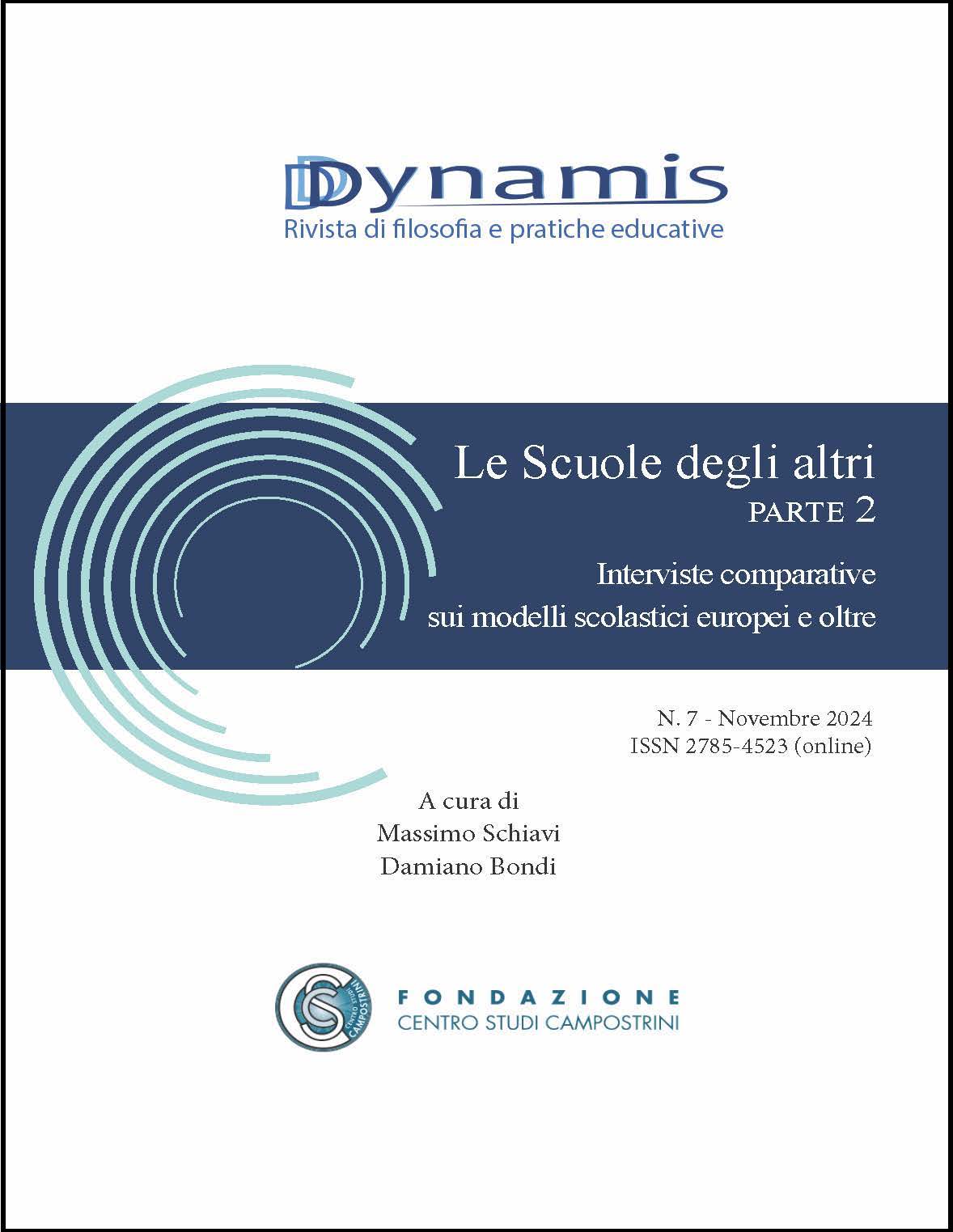
The school of the others #2
No. 7 (2024)We devoted the issue n.5 to the examination of non-italian school systems: we explored how school is thought and done in Finland, England, Spain, Germany, Netherlands, United States.
In this issue we aim to expand out inquiry with a second part, involving new countries: Greece, Sweden, France, Estonia, Switzerland, China.
One of the clichés of Italian public opinion is that the school systems of other countries would be superior to the Italian one. But is it true? What do we really know?
In this issue we want to offer an overview of the functioning of European school systems, highlighting the pedagogical and anthropological principles which inspire them. We then intend to focus on some specifical current educational issues, in order to understand how they have been tackled in different countries: among these, inclusiveness, interdisciplinarity, digital innovation, assessment. We therefore ask experts of European school systems, in the form of an interview, to provide us with data and opinions on “the school of the others”.
-

ASSIGNING A VALUE. Evaluation between theory and practice
No. 6 (2024)The concept of "value" traditionally straddles the realms of ethics and economics. The challenge of this issue of DYNAMIS is to use “value” as a bridge-notion between ethics and education, the latter understood in its most concrete practices, such as assessment. Every week, in every classroom in our countries, teachers assign a value to the performances of students. At mid-year and at the end of the year, students are evaluated through a verbal judgment or a numerical indicator. What actually is being evaluated? A performance, a quantitative acquisition of knowledge, or an index of personal growth? More fundamentally, what is the purpose of evaluation? What goal does a teacher pursue by evaluating their students, and what biases may be at play in this judgment process?
These and other questions we intend to pose to the authors of this issue of DYNAMIS, seeking first to provide an account of how the concept of “value” moves from philosophy to pedagogy, and then to understand how we can best transform it into concrete educational practices.
-

The school of the others #1
No. 5 (2023)One of the clichés of Italian public opinion is that the school systems of other countries would be superior to the Italian one. But is it true? What do we really know?
In this issue we want to offer an overview of the functioning of European school systems, highlighting the pedagogical and anthropological principles which inspire them. We then intend to focus on some specifical current educational issues, in order to understand how they have been tackled in different countries: among these, inclusiveness, interdisciplinarity, digital innovation, assessment.
-
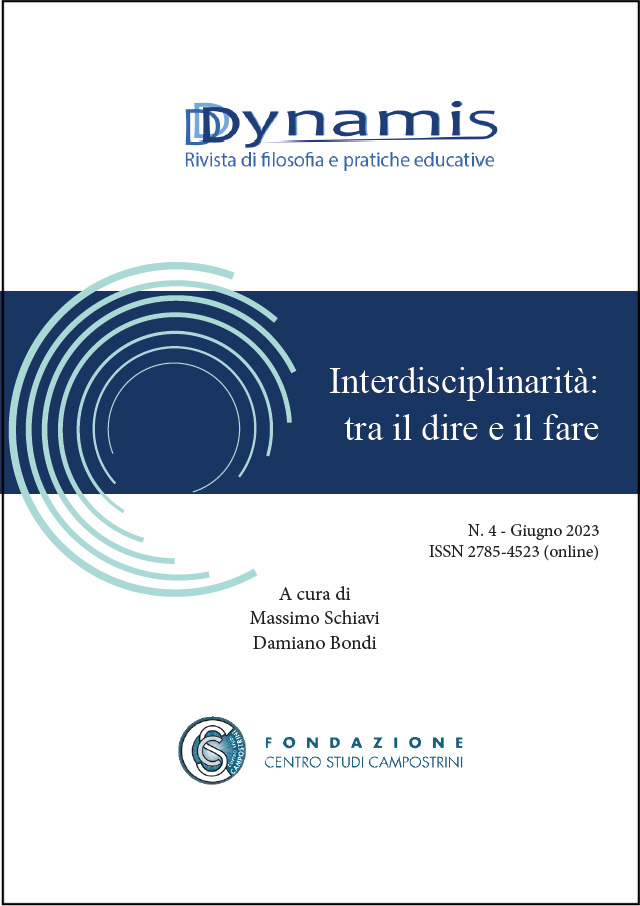
INTERDISCIPLINARITY. Between words and deeds
No. 4 (2023)Interdisciplinarity is a mainstream concept in education and research: it is one of the most present lemmas in pedagogical texts; it appears as the primary approach to guide training, scientific and teaching activities in the national Guidelines; the European Union placed it among the main evaluation criteria for research funding; there is also the Oxford Handbook dedicated to the interdisciplinarity.
But what exactly does “interdisciplinarity” mean? And beyond the good intentions which inspire the several documents about this subject, what does planning, studying, teaching and learning according to an interdisciplinary method concretely entail?
-
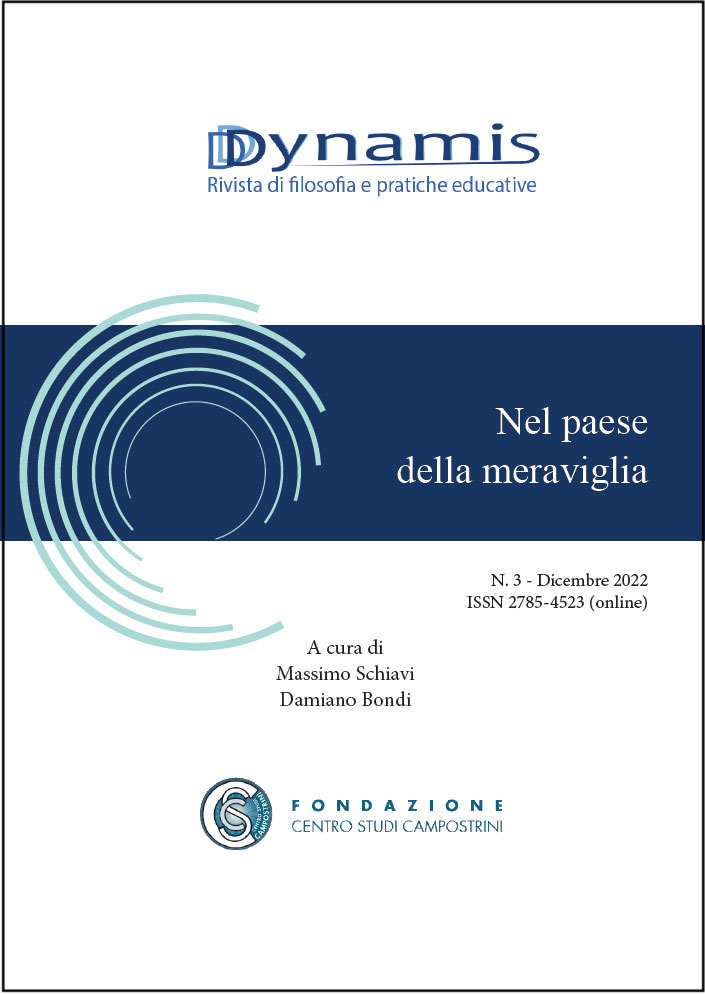
In Wonderland
No. 3 (2022)The loss of wonder is often seen as one of the causes of the lack of motivation of the students and, more generally, outside the classroom, of young people. These would be no longer caught by wonder for anything, and therefore not be pushed to learn nor to engage in other activities, with a consequent state of sloth and depression. The anesthetization of the faculty of wonder is sometimes attributed to a constant hyperstimulation by the world of social media and communication 3.0, and therefore to a growing (induced) need for ever new stimuli, more and more noisy, colorful and intrusive, and less and less demanding in terms of mental and time commitment. The final outcome of this would be a sort of sensory overdose, which would culminate in a state of apathy: nothing would be more truly desirable.
How can the school, and the world of education in general, awaken the dormant sense of wonder, and the consequent motivation to “deal” with the world? Is it useful, or even only possible, to compete with the hyperstimulating models of the social context in which the younger generations live? Is it useful, or even possible, to bring these worlds “inside” educational institutions and agencies?
This issue of DYNAMIS explores these questions, aided by the reflection of two contemporary scholars on the topic of wonder. The two articles by Mario di Paolantonio and Anders Schinkel, in dialogue with the perspectives of more classic authors such as Dewey, Buber and Arendt, focus on wonder in childhood and adolescence.
-

EDUCATING THE EMOTIONS. The role of affectivity in the educational practices.
No. 2 (2022)The emotional dimension has been seen with suspicious and contempt for many centuries in Western culture. Despite of that, today there is a sort of revenge of emotions. The emotional life represents a fundamental part of the human being, a very delicate one, because through it the person is exposed to the influences of the outside world: this dimension, therefore, asks to be educated, not rejected or neglected as a secondary one. However, there is the risk of passing from a vision of emotions in which they should always be "kept under control", when not silenced, to the opposite view, according to which emotions are our "true voice", the voice of our spontaneity that we should primarily follow. Actually, both of these apparently irreconcilable positions often show a common root: they are based on the idea that emotions are something "irrational", as opposed to the "thought".
The vision we propose in this issue, on the other hand, starts from considering emotions as having a cognitive value: that is, they reflect a judgment, not always fully conscious, on the value that some people, objects, situations have for our own life. On this basis, a reflection on educational practices can be developed, which consider emotions as a help for a good life, and as a vehicle for interpersonal dialogue based on mutual understanding. Within the school system this is true not only for students – for whom affectivity education should accompany the learning and the construction of their own identity – but also for teachers, who are called to reflect on their own hierarchies of emotions to better enhance their training work, and to better evaluate the emotional tone within the teacher-student relationship.
-
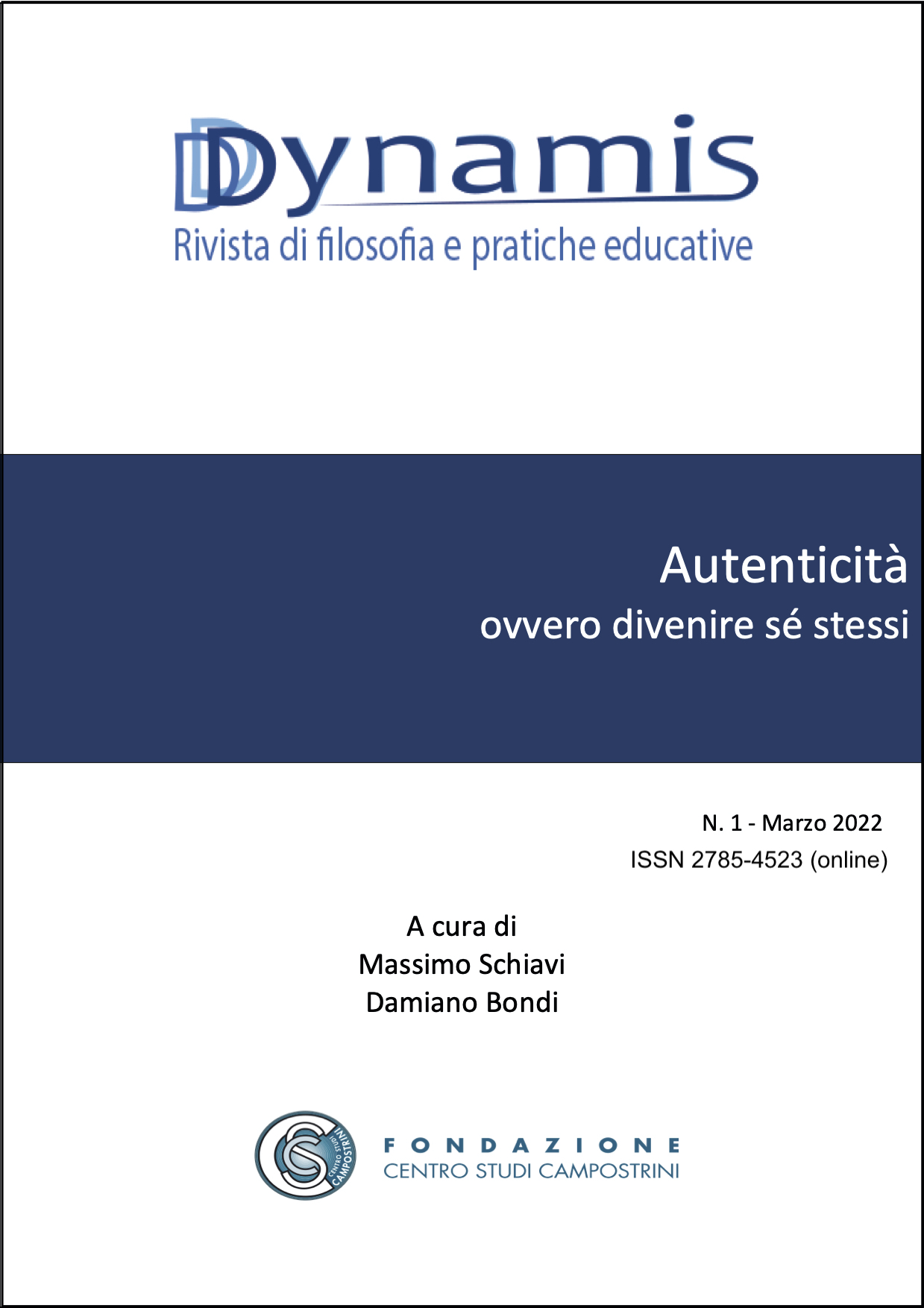
Authenticity. Become yourself
No. 1 (2022)School is one of the main places in which individual identity is built. Self-knowledge and self-construction are a lifelong process, but the school years are absolutely crucial in it: here systematically, for the very first life in time, relationship becomes decisive for self-construction, self-esteem, the ability to face and dialogue with others. The construction of the personality passes through school, improving one’s communication skills and abilities to discern among emotions, desires and attitudes. In this way, the school itself could - and perhaps should - be seen as the place and time in which each person learns who they is and who they would like to be, and not just the place where one learns something else.
We decided to focus on a single aspect of this intricate dynamic, namely on the dimension of authenticity. This instance has become a sort of motto of contemporary society: "Be yourself", "Become what you are" or "Become what you want", as the case may be, are slogans we hear almost everywhere.
To encourage and inspire reflection on this topic, we propose the Italian translation of an article about authenticity by the French philosopher Claude Romano, which has the merit of proposing new perspectives starting from a comparison with the main twentieth-century reflections on this question (Heidegger, Sartre, Foucault, etc..). Claude Romano is Maître de Conférences at the University of Paris-Sorbonne and member of Husserl archive in Paris. Author of many works on the phenomenology of the event, he dedicated a recent work to the topic of authenticity: "Ètre soi même" (Édition Gallimard, Paris, 2019).



